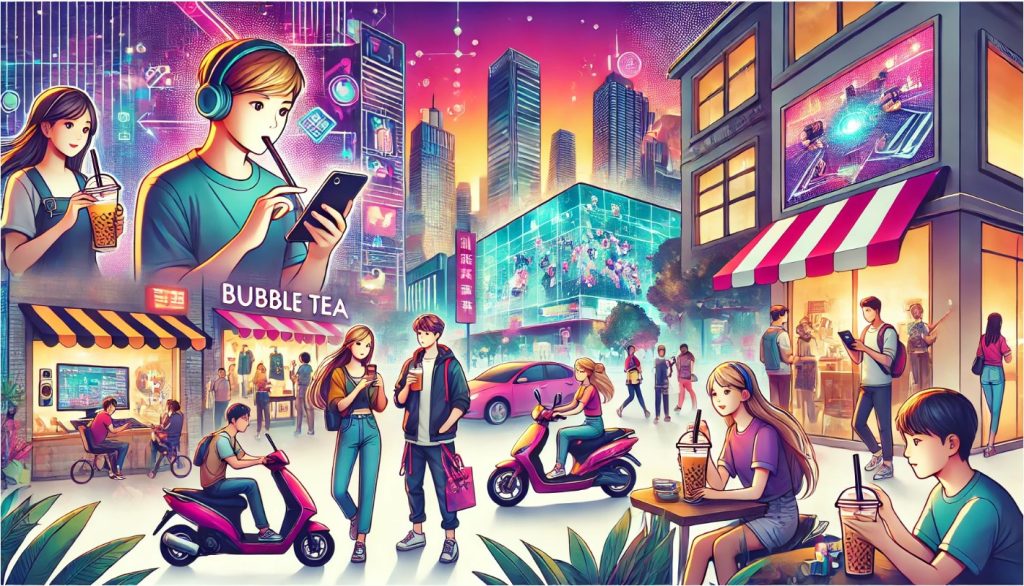Chinese millennials, typically defined as individuals born between 1981 and 1996, represent a dynamic and influential generation in China. Having grown up during a period of rapid economic growth, globalization, and technological innovation, they are characterized by their unique set of values, aspirations, and lifestyles that both reflect and challenge traditional Chinese norms. This generation has witnessed China’s transition from a largely agrarian society to a global economic powerhouse, and their experiences are shaped by a combination of traditional Chinese culture and modern, globalized influences.
Chinese millennials are diverse in their interests and behaviors, but there are key cultural shifts that define their way of life, including their relationship with technology, work-life balance, education, consumer habits, and family dynamics.
The Impact of Technology on Chinese Millennials
Digital Natives and Tech-Savviness
Chinese millennials are often referred to as “digital natives” because they came of age during the rapid expansion of the internet and mobile technology. Their lifestyles are heavily influenced by their seamless integration with digital platforms, especially in terms of socializing, shopping, and entertainment.
- Social Media: Platforms such as WeChat, Weibo, and Douyin (Chinese TikTok) are central to the daily lives of Chinese millennials. These platforms are used not only for socializing but also for staying informed, shopping, and even working. WeChat, for example, is a multifunctional app that combines messaging, payment services, news, and e-commerce into one platform, making it indispensable in everyday life.
- Gaming and Entertainment: Online gaming is a massive industry in China, and many millennials are avid gamers, particularly on mobile devices. Esports tournaments, live-streamed gaming sessions, and digital content creation have become significant forms of entertainment. Platforms like Bilibili, a video-sharing website, allow millennials to engage in niche communities around animation, gaming, and technology.
- Online Shopping: E-commerce platforms like Taobao, JD.com, and Pinduoduo have revolutionized the way Chinese millennials shop. They are accustomed to buying almost everything online, from groceries to electronics to clothing, and appreciate the convenience and speed of home delivery. The prevalence of online shopping has also led to the rise of “live-streaming e-commerce,” where influencers promote products through live broadcasts.
The Role of Social Media in Shaping Identity
For Chinese millennials, social media is not just a tool for communication but an essential platform for identity construction. These platforms allow millennials to curate their lives, share experiences, and build personal brands.
- Influencers and KOLs: Key Opinion Leaders (KOLs) or influencers have become a central part of the Chinese digital ecosystem. Many millennials aspire to become influencers themselves, driven by the potential for fame and financial success. Platforms like Douyin have democratized content creation, allowing anyone with creativity and charisma to gain a following.
- Self-Expression and Aesthetics: Social media enables millennials to express their individuality and aesthetics, especially through fashion, beauty, and lifestyle content. Chinese millennials are known for their interest in the latest fashion trends, and the blending of Western and Chinese cultural elements in their personal style reflects a globalized outlook.
Education and Career Aspirations
Educational Pressures and Opportunities
China’s educational system has long been competitive, and the millennial generation grew up under the intense pressure of academic success. The emphasis on education is deeply ingrained in Chinese culture, where parents invest significant resources in their children’s education to ensure their future success.
- Gaokao and University Admissions: The Gaokao, China’s national university entrance examination, is one of the most significant events in a Chinese millennial’s life. High scores on the Gaokao are crucial for gaining admission to top universities, which in turn open doors to better career opportunities. The Gaokao has been a source of immense stress for Chinese students, as it often determines the trajectory of their futures.
- International Education: Increasingly, Chinese millennials are opting to pursue higher education abroad, particularly in countries like the United States, the United Kingdom, and Australia. This trend reflects a growing desire for global exposure and access to international networks. For some, studying abroad represents a chance to escape the rigid educational system in China, while for others, it is a step toward securing high-paying international job opportunities.
Career Trends and Work-Life Balance
Chinese millennials are navigating a labor market that is increasingly competitive and fast-paced. As they strive for professional success, they are also grappling with balancing career ambitions and personal fulfillment.
- Work Culture and the “996” Phenomenon: The “996” work culture, where employees work from 9 a.m. to 9 p.m., six days a week, has been a topic of significant debate in China. While some millennials are still following this rigorous work schedule, there is growing awareness and pushback against such demands, especially among those who prioritize work-life balance.
- Entrepreneurship and Startups: Many Chinese millennials are embracing entrepreneurship, encouraged by China’s booming startup ecosystem and government policies that support innovation. Cities like Shenzhen and Beijing have become hubs for tech startups, and millennials are eager to launch businesses in areas like e-commerce, artificial intelligence, and mobile apps. The rise of gig economy jobs, driven by platforms like Didi (ride-sharing) and Meituan (food delivery), has also shaped the career choices of millennials, allowing them to pursue flexible and unconventional careers.
- Professional Satisfaction: Despite the pressures, many Chinese millennials are seeking more meaningful careers. This generation is more likely to prioritize job satisfaction, creative expression, and a sense of purpose over traditional markers of success, such as salary or social status.
Consumer Behavior and Spending Habits
The Rise of Consumerism
Chinese millennials are driving the country’s burgeoning consumer market. With more disposable income, they are keen to spend on experiences, luxury goods, and technology. They are highly brand-conscious but also selective about where and how they spend their money.
- Luxury Goods: Millennials in China are significant consumers of luxury brands, including international names like Louis Vuitton, Gucci, and Chanel. However, their approach to luxury consumption is different from previous generations. Many millennials prefer exclusive, high-tech, or customized products that reflect their status and individuality.
- Experience Over Materialism: Unlike previous generations that may have focused more on material possessions, Chinese millennials place a greater emphasis on experiences. This includes travel, dining out, concerts, and other entertainment options. Spending on experiences, particularly travel, has surged among millennials, with destinations in Asia and Europe becoming popular among Chinese youth.
- Sustainability and Ethical Consumption: As global awareness of environmental issues increases, Chinese millennials are also beginning to embrace more sustainable consumption practices. There is a growing trend toward purchasing eco-friendly products, supporting brands with a social mission, and prioritizing quality over quantity.
Digital Payment and Financial Management
China is a global leader in digital payments, and millennials are at the forefront of this shift. Alipay and WeChat Pay have made cashless transactions ubiquitous, with millennials using mobile phones for everything from paying bills to transferring money and shopping.
- Wealth Management and Investment: With a growing middle class, Chinese millennials are becoming increasingly interested in managing their finances. Wealth management services and investment platforms such as Ant Financial and Huobi are becoming popular among this generation. They are more likely to invest in stocks, real estate, and cryptocurrencies compared to previous generations.
- Debt Culture: While China’s millennial generation is relatively financially savvy, there is also a growing culture of debt, especially as young people take out loans for housing or consumer goods. The rise of online financing and buy-now-pay-later services has facilitated this trend.
Family and Relationship Dynamics
Changing Family Structures
Traditional family structures in China, characterized by a focus on the nuclear family and filial piety, are undergoing significant changes among millennials. While family remains important, many millennials are forging their own path in terms of relationships, marriage, and child-rearing.
- Marriage and Children: In contrast to previous generations, many Chinese millennials are delaying marriage and childbirth, prioritizing their careers and personal growth before starting a family. The concept of “duo sheng” (single child) has created a generation where many young people are experiencing the pressures of both personal independence and family expectations.
- Redefining Relationships: Millennials are also more likely to experiment with different types of relationships, including cohabitation before marriage and non-traditional partnerships. However, these shifts are often met with resistance from older generations who uphold more conservative views on marriage and family life.
The Influence of Parents and Generational Expectations
Despite their desire for independence, Chinese millennials remain strongly influenced by their parents’ expectations. Traditional values such as respect for elders, maintaining family honor, and fulfilling parental expectations still hold significant weight in Chinese society.
- Pressure to Succeed: The emphasis on academic and career success is deeply rooted in the traditional Chinese notion of filial piety. Parents often view their children’s success as a reflection of their own social standing, which can place significant pressure on millennials to excel.
- Balancing Modernity and Tradition: Chinese millennials are caught between the traditional values of their parents and the influences of a more globalized, individualistic world. Many young people are finding ways to reconcile these two worlds by integrating elements of both in their personal and professional lives.
Health and Wellness Trends
Fitness and Wellness Culture
Chinese millennials are increasingly conscious of health and wellness. As their disposable incomes grow and lifestyles shift, there has been a noticeable rise in interest in fitness, mental well-being, and healthy eating.
- Fitness Boom: The fitness industry has exploded in China, with gyms, yoga studios, and fitness apps becoming a part of the millennial lifestyle. Social media influencers and fitness KOLs play a major role in promoting fitness trends, encouraging young people to lead healthier lives.
- Dietary Changes: Millennials are also more focused on maintaining balanced diets, with increasing interest in organic food, plant-based diets, and nutritional supplements. The rise of fitness apps and meal delivery services that offer healthy options has made it easier for millennials to adopt a health-conscious lifestyle.
Mental Health Awareness
Alongside physical wellness, there is growing awareness of mental health issues. Chinese millennials are more open about discussing mental health compared to older generations, though stigma still persists in certain areas.
- Stress and Work-Life Balance: The pressure to succeed in education and work can contribute to high levels of stress and burnout. However, millennials are more likely to seek out relaxation techniques, therapy, and mindfulness practices to manage stress. Apps related to meditation and mindfulness are gaining popularity in China as part of the broader wellness trend.
Through these various facets of life, Chinese millennials are reshaping the cultural, economic, and social landscapes of China. As they continue to integrate the best of traditional values with modern influences, their evolving lifestyles will have a lasting impact on the country and its future direction.







